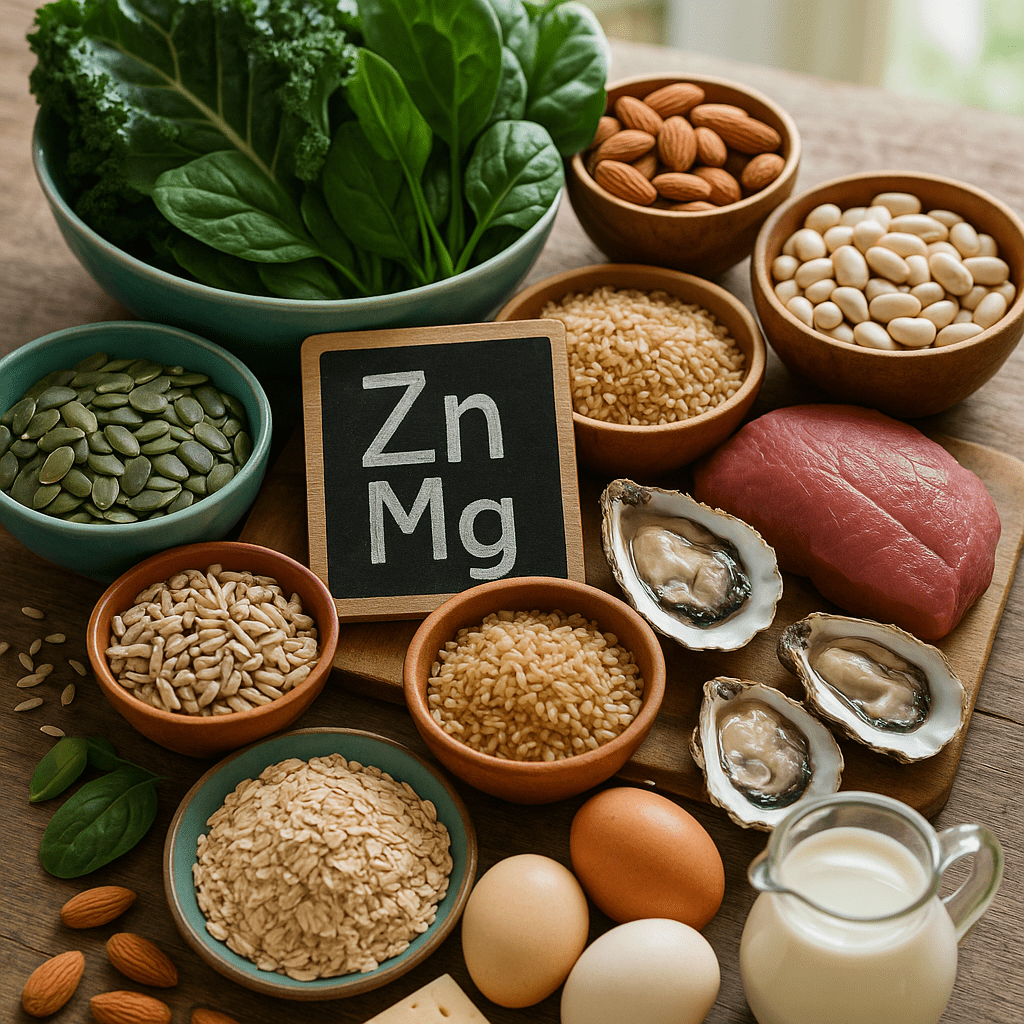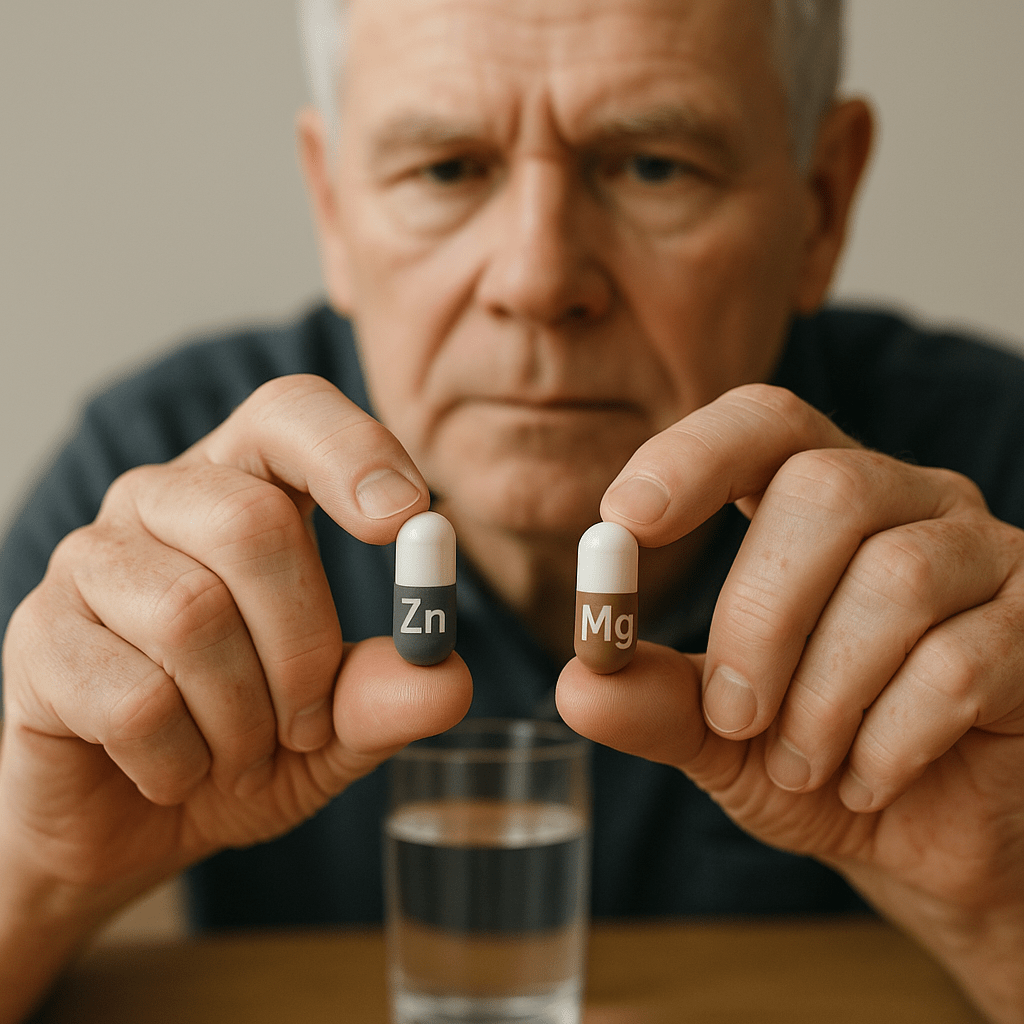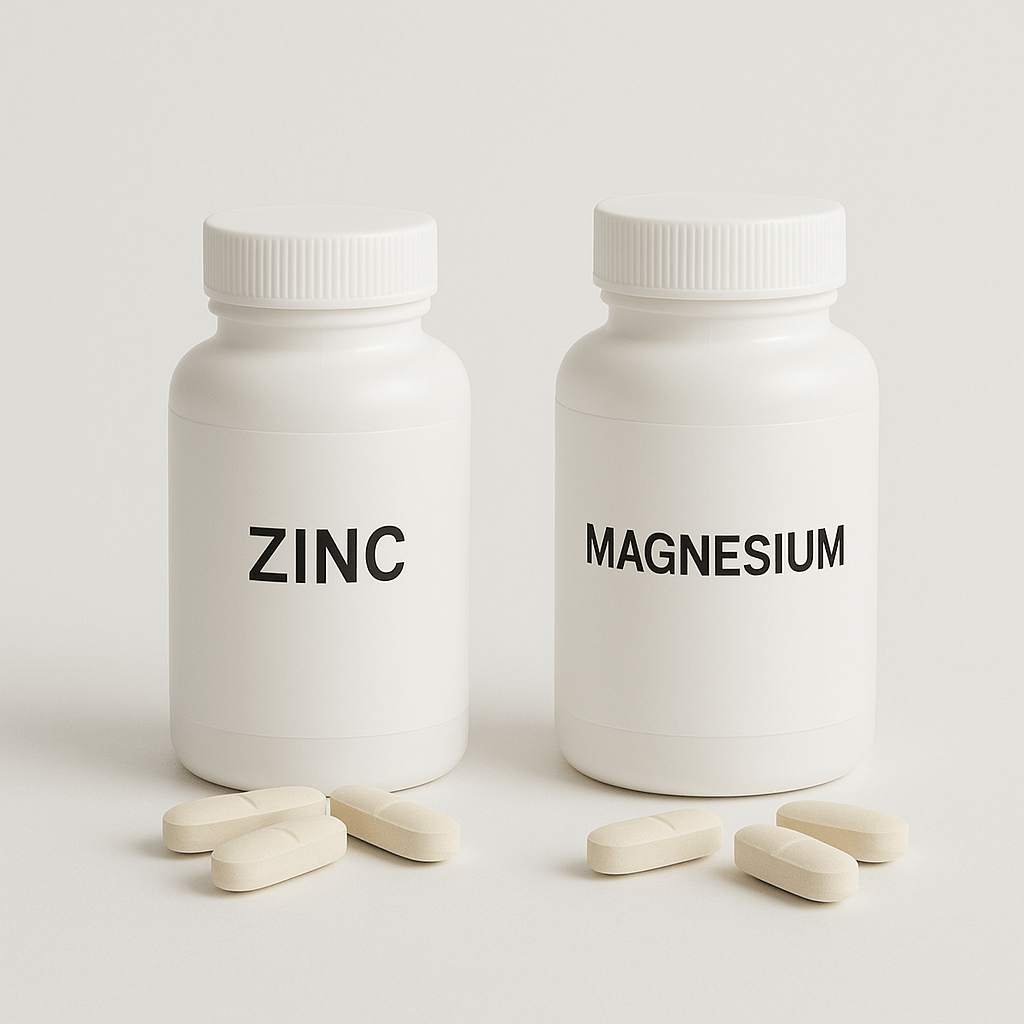Zinc and magnesium are essential minerals that play a vital role in the human body. These two trace elements are involved in hundreds of biochemical reactions, support immune function, maintain normal muscle function, and strengthen bones. While both are essential for good health, many people do not get enough of these minerals from their daily diet.
In this comprehensive article, we will examine the importance of zinc and magnesium in the body, discuss the research-based health benefits, analyze possible deficiency symptoms and risk factors, provide recommendations for proper intake, and discuss natural sources of these minerals. You will also learn how these minerals interact with each other and with other nutrients, and when to consider taking supplements. We will pay special attention to supplements that help support joint and bone health, as both zinc and magnesium are essential for proper bone formation.
Why Zinc and Magnesium Are Essential for the Human Body
Zinc and magnesium are vital trace elements that are involved in almost all body processes. These minerals not only maintain normal body functions, but also ensure optimal long-term health.
Magnesium is the fourth most abundant mineral in the human body – most of it is found in the bones. This mineral is involved in more than 300 biochemical reactions, including protein synthesis, cellular energy production, genetic material replication, muscle function and nerve signal transmission. Sufficient magnesium in the body ensures proper functioning of the nervous system, helps regulate blood pressure and stabilizes heart rhythm.
Meanwhile, zinc, although required in smaller amounts, is an essential component of more than 200 enzymes that regulate various biochemical processes. It plays an important role in the immune system, cell division, DNA synthesis, wound healing and protein metabolism. In addition, zinc helps maintain the senses of taste and smell and is essential for normal growth and development.
Main functions of zinc and magnesium in the body
The functions of zinc and magnesium in the body are diverse and include many physiological processes:
- enzyme activation – both minerals are cofactors for many enzymes
- transmission of nerve impulses – a particularly important function of magnesium
- protein synthesis – necessary for tissue growth and regeneration
- energy metabolism – magnesium is involved in the production of ATP (adenosine triphosphate) – the main source of energy in cells
- antioxidant protection – zinc acts as an antioxidant, protecting cells from oxidative stress
- immune system regulation – zinc enhances the immune response to infections
- gene expression – both minerals are involved in the synthesis of DNA and RNA
Each of these functions is essential for the proper functioning of the body. For example, reduced magnesium levels can cause muscle cramps, fatigue and heart rhythm disorders. Meanwhile, zinc deficiency can weaken the immune response, slow wound healing and cause skin problems.
Recent scientific studies show that adequate zinc levels in the body can reduce the duration and severity of colds. Endoca Natural Zinc Supplements are an excellent choice for those looking for high-quality nutritional supplements that help support normal immune function and skin condition.
Health Benefits of Zinc and Magnesium: What the Science Says
Scientific studies support the numerous health benefits of zinc and magnesium. In addition to their basic functions, these minerals also contribute to overall well-being and specific aspects of health.
Magnesium is particularly important for the functioning of the nervous system. It helps regulate neurotransmitter activity and inhibits excessive excitability of the nervous system. Studies show that adequate magnesium levels in the body can reduce stress levels, improve sleep quality, and help combat symptoms of depression. In addition, magnesium is essential for calcium absorption and metabolism, making it essential for strengthening bones and preventing osteoporosis.
Zinc’s role in the immune system is well documented. In addition to promoting the production and maturation of immune cells, it also regulates inflammation. Adequate zinc levels in the body can shorten the duration of colds, reduce the risk of respiratory infections, and improve wound healing. Zinc is also important for skin health – it contributes to collagen production, skin regeneration and can help treat conditions such as acne and eczema.
Magnesium is particularly important for athletes as it is involved in glucose metabolism and cellular energy production. Adequate levels of magnesium can improve physical performance, reduce muscle fatigue and speed up recovery from intense training. Magnesium also helps regulate electrolyte balance, which is especially important during prolonged physical exertion.
Studies also confirm the importance of zinc for male reproductive health. It is involved in the production of testosterone and sperm maturation. In women, zinc can help regulate menstrual cycle hormones and reduce symptoms of premenstrual syndrome.
Both of these minerals are also important for brain function – they are involved in neuroplasticity processes and may contribute to improving cognitive function. Recent studies show a link between adequate magnesium intake and a reduced risk of Alzheimer’s disease.
Who benefits from zinc or magnesium supplementation
While zinc and magnesium are essential for everyone, there are certain groups who may benefit from supplementation with these minerals:
- athletes – due to increased sweating and increased metabolism
- elderly people – due to reduced mineral absorption efficiency
- pregnant and nursing women – due to increased mineral needs
- vegans and vegetarians – due to limited absorption of some minerals from plant products
- people with digestive disorders – especially malabsorption syndromes
- people taking certain medications (e.g. diuretics, antacids)
For many of these groups, specialized nutritional supplements for the nervous system with magnesium may be particularly beneficial, as they help maintain normal nervous system function and reduce the effects of stress on the body.
Deficiency Symptoms and Risk Factors
Zinc and magnesium deficiencies can manifest themselves in a variety of ways, which are often subtle and can be mistaken for other health conditions. Being able to recognize these signs and understand the risk factors is an important step in ensuring optimal mineral balance.
Symptoms of magnesium deficiency often involve the nervous and muscular systems. Early signs may include:
- muscle twitching and cramps
- fatigue and weakness
- increased irritability
- insomnia and sleep disorders
- lack of appetite
- nausea and vomiting
In more severe cases of magnesium deficiency, paresthesia (tingling and numbness), heart rhythm disturbances, muscle weakness, seizures, and even personality changes may occur. Long-term magnesium deficiency is associated with an increased risk of hypertension, diabetes, osteoporosis, and heart disease.
Symptoms of zinc deficiency can be subtle and develop gradually. Common symptoms:
- hair loss
- impaired sense of taste and smell
- slow wound healing
- skin problems (rash, acne)
- increased susceptibility to infections
- loss of appetite
- diarrhea
In children, zinc deficiency can cause growth retardation and delayed puberty. In adults, it can cause reduced fertility and sexual dysfunction.
The main risk factors that increase the likelihood of magnesium and zinc deficiency:
- unbalanced diet with low levels of whole grains, nuts, seeds and green leafy vegetables
- alcohol abuse
- use of certain medications (diuretics, antibiotics, antacids)
- chronic diseases of the digestive tract (celiac disease, inflammatory bowel disease, Crohn’s disease)
diabetes - intense physical activity without an appropriate mineral supplementation strategy
- older age
According to the World Health Organization, magnesium deficiency affects about 10-30% of the population in developed countries, and zinc deficiency is even more common, especially in developing countries. In Lithuania, as in other Northern European countries, mineral deficiencies are often associated with seasonality and limited availability of fresh local products during the winter months.
It is important to note that self-diagnosis of mineral deficiencies can be misleading. Symptoms are often non-specific and may be signs of other health conditions. If you suspect a mineral deficiency, it is recommended to consult a healthcare professional who can order appropriate tests and provide individual recommendations.
Food Sources, Supplements, and Usage Recommendations
Optimal zinc and magnesium intake should primarily be achieved through a balanced diet.

However, in some cases, supplements can be helpful in filling nutritional gaps or addressing specific health needs.
Magnesium is abundant in a variety of foods, especially:
- green leafy vegetables (spinach, kale)
whole grains (brown rice, buckwheat, oats) - legumes (beans, lentils)
- nuts and seeds (almonds, pumpkin seeds, flaxseed)
- seafood (especially seaweed products)
- dark chocolate (high in cocoa)
- bananas and avocados
The main sources of zinc are:
- seafood (especially oysters)
- red meat (beef, lamb)
- poultry
- dairy products
- eggs
- beans and lentils
- seeds (pumpkin, sunflower)
- whole grains
- nuts (especially chestnuts and cashews)
Recommended daily intake magnesium intake for adults:
- men: 400-420 mg per day
- women: 310-320 mg per day (additional 40 mg during pregnancy)
Recommended daily zinc intake for adults:
- men: 11 mg per day
- women: 8 mg per day (additional 3 mg during pregnancy)
Supplement recommendations depend on individual needs, but there are some general tips:
Magnesium is better absorbed when taken in several doses throughout the day, rather than the entire daily dose at once.

Magnesium is often recommended to be taken in the evening as it can help you relax and improve your sleep quality. Magnesium citrate, glycinate and bisglycinate are considered the most absorbable forms of magnesium.
Zinc supplements are best taken with food to avoid stomach irritation. However, it should be noted that some food components (e.g. phytins from grain products) can reduce zinc absorption. Zinc glycinate and picolinate are considered effective and well-absorbed forms.
KIKI Health oral electrolytes are a convenient and effective way to replenish magnesium and other important electrolytes in the body. This concentrate is especially useful after intense exercise, on hot days or during illness, when the body loses a lot of electrolytes.
It is important to know that zinc and magnesium can be taken together, but high doses can compete for absorption.

Therefore, if both supplements are taken in high doses, it is recommended to take them at different times.
Other nutritional factors are also important for the absorption of zinc and magnesium:
- vitamin D improves magnesium absorption
- vitamin B6 helps magnesium enter cells
- vitamin A works synergistically with zinc
- high calcium levels can interfere with the absorption of magnesium and zinc
When choosing supplements, it is worth paying attention to the quality and composition. High-quality supplements should not contain unnecessary additives, dyes or preservatives. In addition, it is important to consider the form of the minerals – organic forms (citrates, gluconates, picolinates) are usually better absorbed than inorganic ones (oxides, sulfates).
Safety, Contraindications and Interactions with Other Nutrients
Although zinc and magnesium are essential for our bodies, their consumption should be responsible and considered. Excessive amounts of these minerals can cause adverse effects, and certain interactions with medications or other nutrients can reduce their effectiveness.
Magnesium Safety Aspects:
The upper safe limit for magnesium from supplements is 350-400 mg per day (not including magnesium from food). Exceeding this limit can cause side effects such as diarrhea, abdominal pain and nausea. In severe cases of overdose (usually in the presence of renal dysfunction), magnesium toxicosis can occur with symptoms such as hypotension, respiratory depression, cardiac arrhythmias and even coma.
Magnesium supplements should be avoided or taken only under medical supervision if you have:
- severe renal failure
- myasthenia gravis
- heart block
Zinc safety considerations:
The upper safe limit for zinc in adults is about 40 mg per day. Long-term use of high doses of zinc can cause copper deficiency and associated hematological and neurological symptoms. Acute overdose may present with nausea, vomiting, stomach cramps, headaches, and loss of appetite.
Zinc supplements should be avoided or used with caution by:
- people taking copper supplements
- people with hemochromatosis (an iron storage disease)
Drug interactions:
Magnesium may interact with the following drugs:
- antibiotics (tetracycline, fluoroquinolone groups) – reduces their effectiveness
- bisphosphonates (used to treat osteoporosis) – reduces their absorption
- diuretics – some increase magnesium excretion, others decrease
- proton pump inhibitors – long-term use may reduce magnesium absorption
Zinc may interact with:
antibiotics – reduces their and its own absorption
- penicillamine – reduces the absorption of both substances
- diuretics – some increase zinc excretion in the urine
- Interactions with other nutrients:
There are some interactions between zinc and magnesium. High doses of zinc can interfere with magnesium absorption and vice versa. However, at normal doses, these minerals complement each other’s actions.
Other important interactions:
- phytins (found in grains, legumes) reduce the absorption of zinc and magnesium
- oxalates (found in spinach, rhubarb) may reduce the absorption of magnesium
- high calcium levels can compete with magnesium and zinc for absorption
- copper and zinc compete for absorption – long-term use of high doses of zinc can cause copper deficiency
- iron may reduce zinc absorption, especially when taken outside of food
Special cases and myths:
Contrary to popular belief, zinc does not improve testosterone levels in healthy men in the absence of zinc deficiency. Zinc supplements should not be used as a testosterone booster without a clear medical indication.
It is also important to note that although magnesium is often recommended for the treatment of cramps, the scientific evidence for its effectiveness in this case is conflicting. Magnesium supplements may only help those who are magnesium deficient.
While natural food sources rarely cause mineral excess, taking supplements requires caution. It is always recommended to consult a doctor or pharmacist before taking any supplements, especially if you are already taking medication or have a health condition.

Conclusion
Zinc and magnesium are essential minerals that perform a variety of vital functions in our bodies. From supporting the immune system and supporting the nervous system to energy production and skin health, these minerals are involved in hundreds of biochemical processes.
A balanced diet rich in whole grains, leafy green vegetables, nuts, seeds and high-quality proteins is the best way to ensure adequate zinc and magnesium levels in the body. However, in certain cases – in cases of increased needs, malabsorption syndromes or specific medical conditions – supplements can be a valuable aid.
It is important to remember that mineral supplements should be used responsibly, not exceeding recommended doses and taking into account possible interactions with medications or other nutrients. It is ideal to consult a healthcare professional before starting to take supplements, who can assess individual needs and recommend the appropriate dosage.
Ultimately, optimal levels of zinc and magnesium are an investment in long-term health and well-being. By taking care of the balance of these minerals, we invest in our immune system, nerve and muscle functioning, energy levels, and overall body resistance.
FAQ (Frequently Asked Questions)
What are the main benefits of zinc and magnesium for the body?
Zinc strengthens the immune system, maintains normal skin, hair and nails, while magnesium helps reduce fatigue, ensures normal muscle and nervous system function and contributes to energy production. Both of these minerals are essential for the overall well-being of the body.
What are the most common signs of zinc and magnesium deficiency?
Symptoms of deficiency include fatigue, muscle cramps, weakened immunity, hair loss, brittle nails and slow wound healing. It is important to recognize and address potential deficiency problems early.
Can zinc and magnesium supplements be taken together?
Yes, zinc and magnesium supplements can be taken together, many preparations combine these minerals. For optimal absorption, it is recommended to follow the dosage recommendations and avoid high doses without medical supervision.
Who is recommended to take zinc and magnesium supplements?
Supplements may be beneficial for individuals with poor nutrition, athletes, the elderly, pregnant women, or those showing symptoms of deficiency. It is always recommended to consult a healthcare professional before starting use.
Are there any safety concerns or contraindications to taking zinc and magnesium supplements?
Supplements are safe when taken at recommended doses. Excessive use may cause side effects or interact with certain medications. Discuss supplement use with a healthcare professional, especially if you have a chronic condition or are taking medications.

